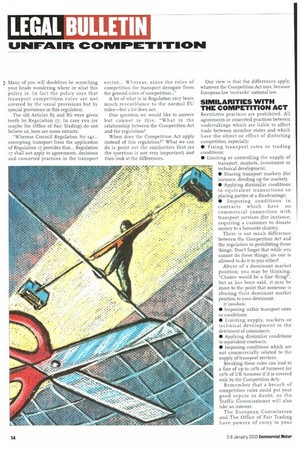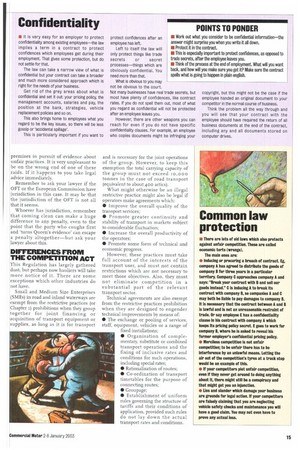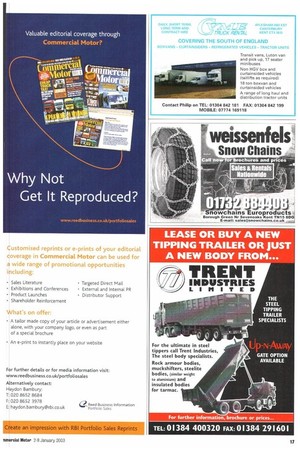) Many of you will doubtless be scratching your heads
Page 14

Page 15

Page 17

If you've noticed an error in this article please click here to report it so we can fix it.
wondering where or what this policy is. In fact the policy says that transport competition rules are not covered by the usual provisions but by special provisions in this regulation.
The old Articles 85 and 86 were given teeth by Regulation 17. In case you (or maybe the Office of Fair Trading) do not believe us, here are some extracts: "Whereas Council Regulation No 141... exempting transport from the application of Regulation 17 provides that... Regulation 17 shall not apply to agreements, decisions and concerted practices in the transport sector... Whereas, since the rules of competition for transport derogate from the general rules of competition..."
A lot of what is in Regulation 1017 bears much resemblance to the normal EU rules—but a lot does not.
One question we would like to answer but cannot is this: "What is the relationship between the Competition Act and the regulation?
When does the Competition Act apply instead of this regulation?" What we can do is point out the similarities first (so the question is not very important) and then look at the differences. Our view is that the differences apply, whatever the Competition Act says, because European law 'outranks' national law.
SIMILARITIES WITH THE COMPETITION ACT
Restrictive practices are prohibited. All agreements or concerted practices between undertakings which are liable to affect trade between member states and which have the object or effect of distorting competition. especially: • Fixing transport rates or trading conditions; • Limiting or controlling the supply of transport, markets, investment or technical development; • Sharing transport markets (for instance, dividing up the market); • Applying dissimilar conditions to equivalent transactions so placing parties at a disadvantage; • Imposing conditions in contracts which have no commercial connection with transport services (for instance, requiring a customer to donate money to a favourite charity).
There is not much difference between the Competition Act and the regulation in prohibiting these things. Don't forget that while you cannot do these things, no one is allowed to do it to you either!
Abuse of a dominant market position: you may be thinking, "Chance would be a fine thing!", but as has been said, it may be more to the point that someone is abusing their dominant market position to your detriment.
It involves: • Imposing unfair transport rates or conditions; • Limiting supply, markets or technical development to the detriment of consumers; • Applying dissimilar conditions to equivalent contracts; • Imposing conditions which are not commercially related to the supply of transport services.
Breaking these rules can lead to a fine of up to ro% of turnover (or ro% of UK turnover if it is covered only by the Competition Act).
Remember that a breach of competition rules could put your good oo repute in doubt, so the Traffic Commissioner will also take an interest.
The European Commission and The Office of Fair Trading have powers of entry to your premises in pursuit of evidence about unfair practices. It is very unpleasant to be on the wrong end of one of these raids. If it happens to you take legal advice immediately.
Remember to ask your lawyer if the OFT or the European Commission have jurisdiction in this case. It may be that the jurisdiction of the OFT is not all that it seems.
Whoever has jurisdiction, remember that coming clean can make a huge difference to any penalty, even to the point that the party who coughs first and 'turns Queen's evidence' can escape a penalty altogether—but ask your lawyer about this.
DIFFERENCES FROM THE COMPETITION ACT
'fins Regulation has largely gathered dust, but perhaps now hauliers will take more notice of it. There are some exceptions which other industries do not have.
Small and Medium Size Enterprises (SMEs) in road and inland waterways are exempt from the restrictive practices (or Chapter I) prohibitions when they group together for joint financing or acquisition of transport equipment or supplies, as long as it is for transport
and is necessary for the joint operations of the group. However, to keep this exemption the total carrying capacity of the group must not exceed io,000 tonnes in the case of road transport (equivalent to about 400 artics).
What might otherwise be an illegal restrictive practice might also be legal if operators make agreements which: • Improve the overall quality of the transport services; • Promote greater continuity and stability of transport in markets subject to considerable fluctuation; • Increase the overall productivity of the operators; • Promote some form of technical and economic progress.
However, these practices must take full account of the interests of the transport user, and must not contain restrictions which are not necessary to meet those objectives. Also, they must not eliminate competition in a substantial part of the relevant transport sector.
Technical agreements are also exempt from the restrictive practices prohibition when they are designed to engender technical improvements by means of: • The exchange or pooling of services, staff, equipment, vehicles or a range of fixed installations; • Organisation of complementary, substitute or combined transport operations and the fixing of inclusive rates and conditions for such operations, including special rates: • Rationalisation of routes; • Co-ordination of transport timetables for the purpose of connecting routes; • Groupage: • Establishment of uniform rules governing the structure of tariffs and their conditions of application, provided such rules do not lay down the actual transport rates and conditions.
nmerclal Motor 2-8 January 2003 17
































































































































